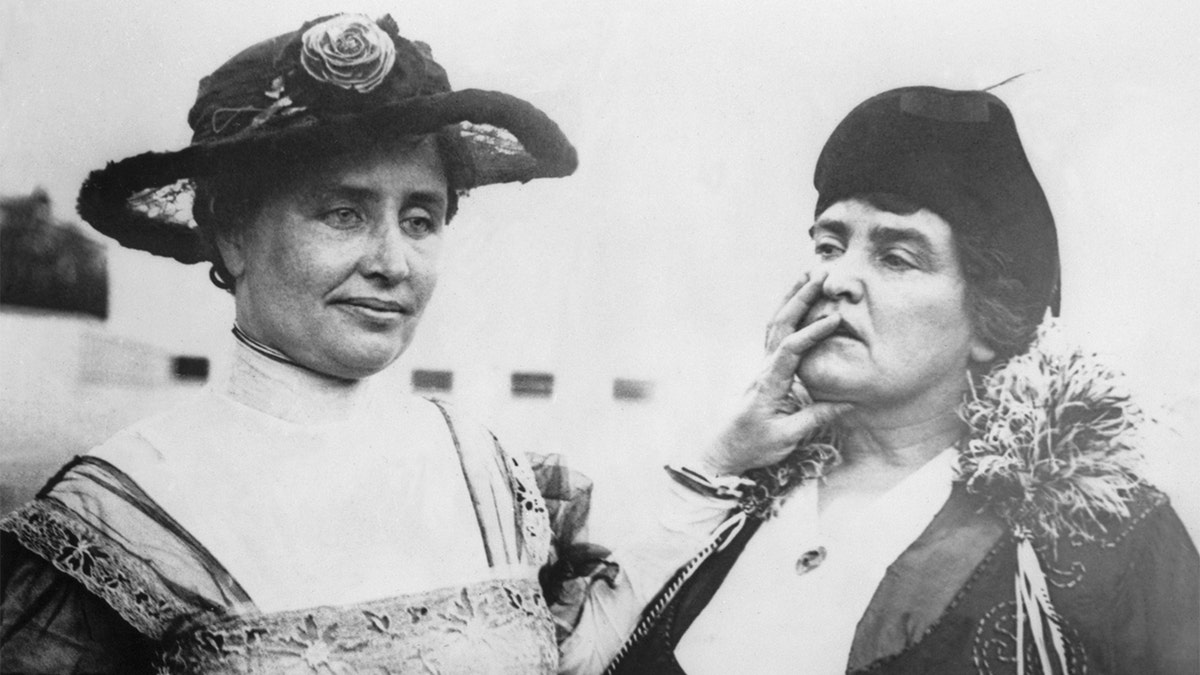Fox News Flash top headlines for March 18
Fox News Flash top headlines are here. Check out what's clicking on Foxnews.com.
Helen Keller, who became blind and deaf before the age of two, is recognized for her strength and courage when faced with overwhelming odds.
Keller was born in Tuscumbia, Alabama in 1880. However, before her second birthday, she suffered a serious illness, presumed to be either meningitis or scarlet fever, according to the National Women's History Museum (NWHM).
Suddenly, she was faced with an entirely new life, as she lost her ability to see and hear.
BIANCA SMITH: WHAT TO KNOW ABOUT THE FIRST BLACK FEMALE COACH IN PRO BASEBALL
However, Keller eventually overcame both obstacles thanks in large part to her teacher Anne Sullivan, who faced similar hardships.

Helen Keller stands with her teacher, Anne Sullivan in 1915 (Getty Images)
Sullivan, who suffered from severe vision loss and was a graduate of the Perkins School for the Blind, "became Keller’s lifelong teacher and mentor" according to the NWHM.
Using touch, Sullivan was able to teach Keller the alphabet and how to spell entire words, according to the NWHM.
GINA HASPEL: WHAT TO KNOW ABOUT THE CIA'S FIRST FEMALE DIRECTOR
After a year, Sullivan and Keller went to the Perkins School in Boston so Keller could learn braille and write.
When she was 14 years old, Keller went to New York to improve her speaking ability. Eventually, she attended the Cambridge School for Young Ladies in Massachusetts, and thanks to Sullivan’s tutoring, she was later admitted to Radcliffe College.
Sullivan was by her side the entire time as she studied and eventually graduated cum laude in 1904.
However, before even receiving her diploma, Keller had already published two books: "The Story of My Life" in 1902 followed by "Optimism" one year later, according to the NWHM.
CLICK HERE TO GET THE FOX NEWS APP
Throughout her life, Keller advocated for causes such as preventing blindness in children by authoring various books and magazine articles.
In 1915, she founded the American Foundation for Overseas Blind, which later became Helen Keller International, to support World War I veterans who had been blinded in combat.
The organization later expanded to address both the causes and consequences of blindness, malnutrition and poor health, according to Helen Keller International.
MALALA YOUSAFZAI: WHAT TO KNOW ABOUT THE PAKISTANI ACTIVIST FOR GIRLS' EDUCATION
She quickly became a spokesperson and ambassador for the American Foundation for the Blind and was awarded the Presidential Medal of Freedom by President Lyndon Johnson in 1964, according to the foundation.
Although she was deemed a "symbol of courage," Keller was also a "woman of luminous intelligence, high ambition and great accomplishment," according to the foundation's website.
Up until her death in June 1968, she had been "driven by her deep compassion for others to devote her life to helping them overcome significant obstacles to living healthy and productive lives," the foundation wrote.












































